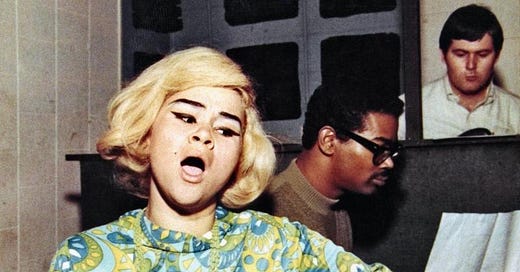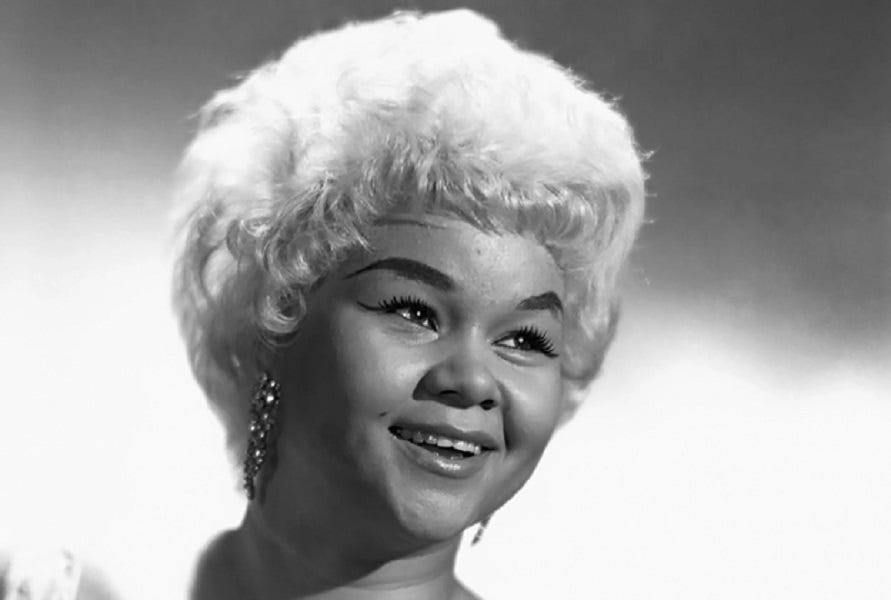Etta James (January 25, 1938 – January 20, 2012) – All The Way Down (1973)
The legendary R&B singer was battling drug addiction when she recorded this epic soul/funk masterpiece, the lead single from one of her finest albums.
View most updated version of this post on Substack
Open YouTube playlist of all songs in this post
Search our full archives
Etta James is universally regarded to have been one of the greatest singers of all time. Her very first record went to #1 R&B in 1955, and she overcame many troubles in her personal life to sustain a recording and performing career that stretched over the next five decades.
Jamesetta Hawkins was born in Los Angeles, California. Her mother Dorothy Hawkins was only 14 at the time. Jamesetta grew up not knowing who her father was, but speculated in later years that he may have been professional pool player Rudolf Wanderone, aka “Minnesota Fats.” Her mother was largely absent from her childhood, leaving her to be raised in Watts by her grandparents and a series of foster parents. Her foster father “Sarge” was abusive, and would wake her in the middle of the night while hosting drunken poker games, demanding she sing for his buddies.
She began singing in the choir at St. Paul Baptist Church in South Central L.A. when she was five years old. The choir director there would often hit her in the chest when she sang to make her voice come from her gut.
In 1950, when she was twelve, her foster mother died and Dorothy Hawkins reappeared, moving the both of them to San Francisco. She formed an all-female doo-wop group called the Creolettes, and two years later was discovered by producer and talent scout Johnny Otis. He helped them sign to Modern Records, changed their name to the Peaches, and gave Jamesetta the stage name “Etta James.”
They recorded an answer song to Hank Ballard's 1954 R&B hit “Work With Me, Annie” that Otis and James co-wrote, “The Wallflower,” aka “Roll with Me, Henry.” Released in early 1955, it shot to #1 on the R&B charts and stayed there for a month, becoming one of the biggest R&B records of the year and helping shape the emerging sound of rock’n’roll.
The song’s success earned James and the Peaches a spot opening for Little Richard on his 1955 national tour. While on the road, the pop singer Georgia Gibbs recorded a sanitized version of their hit (re-titled “Dance With Me, Henry”) that went to #1 on the Billboard Hot 100.
She left the Peaches and began releasing singles as a solo artist, but other than “Good Rockin’ Daddy,” a #6 R&B hit released in late 1955, none of her subsequent records charted for the next five years. At age 16, she became involved with guitarist B.B. King, whose song “Sweet Sixteen” was reportedly written about her.
In 1960 she switched labels to Chess Records, and returned to the charts with a #6 R&B duet with her new boyfriend Harvey Fuqua of the Moonglows, the heartfelt “If I Can't Have You.” They followed it up with a superb cover of Howlin’ Wolf’s “Spoonful” which hit #12 R&B.
James appeared on an episode of the short-lived TV show The !!!! Beat that showcased soul artists for one season in 1966 and was a pre-cursor to Soul Train. Viewers were blessed with an epic rendition of her #4 R&B hit from 1962 “Something's Got A Hold On Me.”
In early 1968, she appeared on one of the first episodes of Dick Clark’s weekly live music TV show Happening ‘68. She performed her 1967 song “Tell Mama,” which had gone to #10 R&B and crossed over to #23 on the Hot 100, becoming her biggest-ever pop hit. It was recorded at FAME Studios in Muscle Shoals, Alabama and co-written by Marcus Daniel, Wilbur Terrell, and the great Clarence Carter.
In the early seventies, James’ career hit a rough patch. Tell Mama (1968) had reached #21 R&B, but after that she went five years without an album on the charts.
Both Etta James Sings Funk (1970) and Losers Weepers (1971) were produced or co-produced by Ralph Bass, and both failed to chart. Only one single from either album was even a minor hit, the gospel-flavored title track “Losers, Weepers (Part 1)” which peaked at #26 R&B and #94 on the Hot 100. It was written by Leon David Bonds, arranged by Gene Barge, and co-produced by Barge and Bass. Like the rest of Losers Weepers, it featured Minnie Riperton on backing vocals.
Losers Weepers had many highlights, and deserved to have been more widely heard. Stand-out cuts included the laid back “I Think It's You,” the gospel-flavored loneliness anthem “Someone,” the epic closing cut “Ease Away A Little Bit At A Time,” and the phenomenal jam “You’re The Fool,” which was written by unsung Detroit singer/songwriter Sharon McMahan.
During the mid-sixties, James had become addicted to heroin. She was arrested several times for writing bad checks to fund her habit. James was briefly imprisoned at Rikers Island after she and her friend and fellow singer/addict Esther Phillips cooked up a scheme to rip off New York City hotels by having them cash the two women’s worthless personal checks. She also spent four months locked up at the Cook County jail in Chicago.
In the early seventies James and her husband Artis Mills were both arrested for possession, and he took the rap and began serving a ten-year prison sentence. She avoided jail time when she was sentenced to rehab in early 1974, and spent the next 17 months at the Tarzana Psychiatric Hospital in California. But before her confinement, in 1973 she managed to record a self-titled LP that was arguably her masterpiece album.
Chess paired her with producer Gabriel Mekler, who had previously produced Steppenwolf and Three Dog Night while working for ABC/Dunhill Records. It was Mekler who suggested the group name themselves “Steppenwolf” after he read the novel by Hermann Hesse.
Mekler, saxophonist Trevor Lawrence, and songwriter Catherine C. Williamson co-wrote Etta James’ epic lead single “All The Way Down” and its funky B-side “Lay Back Daddy,” which hit #29 R&B. Lawrence arranged the album’s horns and Jimmie Haskell arranged its strings. Session musicians included bassist Chuck Rainey, William D. Smith on keyboards, Ken Marco on guitar, King Errisson on congas and percussion, and Kenneth “Spider Webb” Rice on drums.
The LP’s second single was the Randy Newman-penned “Leave Your Hat On,” b/w the superb upbeat jam “Only A Fool,” which was co-written by James with Lawrence and Mekler. Released in early 1974, it peaked at #76 R&B.
Another of Randy Newman’s songs featured on the album was the powerful “God's Song (That's Why I Love Mankind).” The gospel slow burner “Yesterday's Music” was co-written by Blood, Sweat & Tears lead singer David Clayton-Thomas and his fellow Canadian songwriter William “Smitty” Smith. Its closing cut “Just One More Day” was a a cover of the Otis Redding classic, co-written by Redding with McElvoy Robinson and Steve Cropper.
Chess threw an elaborate album release party for Etta James at the Troubadour nightclub in West Hollywood, at which James performed. It brought her back to the R&B album charts when it landed at #41, reached #154 on the Billboard 200, and was nominated for a Grammy.
Happy Heavenly Birthday to the great Etta James.
Further info:
“Remembering Etta James, Stunning Singer,” by Neda Ulaby, All Things Considered, NPR, January 20, 2012.
“Etta James Dies at 73; Voice Behind 'At Last',” obituary, The New York Times, January 21, 2012.
“Etta James: R&B in its original sense,” The Current, February 26, 2018.
“The Tragic Real-Life Story of Etta James,” by Marina Manoukian, Grunge.com, September 30, 2023.
#soul #funk #R&B #ChessRecords #GabrielMekler #EttaJames






